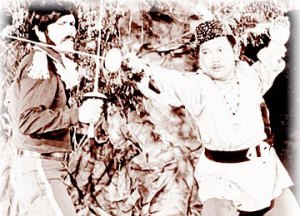Midweek
By BUNN NAGARA
Civilian casualties mount in Afghanistan and Pakistan with no change in US policy
RECENT reports tend to focus on President Barack Obama’s withdrawal plans for Iraq, but the bigger news is the escalation of war in Afghanistan and (unofficially) Pakistan.
Obama has said the fight against terrorism must be waged in Afghanistan and Pakistan rather than Iraq.
The increasingly bitter battle between the status quo and insurgents in both countries lies at the core of a vicious cycle.
The situation is unravelling through steady upsurges in violence and victims.
All sources report growing mayhem in every category of fighting, combatants and civilian bystanders.
Obama has inherited a deepening conflict that is also increasingly complex.
It is no longer just a war or even a civil war in one country like Iraq, but a widening conflict across two countries in their common border regions.
Over the weekend, US military leaders observed that Obama is more analytical than George W.Bush. Any strategic value-added which comes with that remains to be seen.
The festering problems in Afghanistan and Pakistan demand urgent and competent attention.
For example, a lull or reduction in fighting in one country need not be an advantage because it may only mean an increase in violence in the other.
Pakistan on Saturday said its forces had beaten back the Taliban in a border region near Afghanistan.
That usually means the Taliban had only withdrawn to their alternate Afghan bases to re-group, better to strike in Pakistan again.
For such elusive victories to be so common is bad enough.
That Pakistan is also nuclear-armed increases the incentive to destabilise it for any self-respecting terrorist.
An obvious solution would then be simultaneous strikes against rebel strongholds in the border regions.
But because of the multitiered political processes needed for sharp coordination between all the concerned governments and their armed forces, that prospect remains a distant reality.
So the Obama administration seems stuck with the old Bush tactic of attacking border villages suspected of harbouring the enemy.
This typically involves pilotless US drones that identify homes supposed to be legitimate targets for bombardment.
Every such operation incurs more civilian casualties, official displeasure and further losses in political, moral and other terms.
In the process, US officials rile both governments, alienate both peoples, offend all local leaders and nurture more sympathy for what is being seen as the armed resistance.
The result is to develop fertile ground for Taliban and al-Qaeda sentiments and operatives.
In continuing and extending the Bush military doctrine of “shock and awe,” US forces may be winning the military battle only to lose the political war.
Even to handle a Third World country in dire straits like Afghanistan, the US superpower now has to look to China.
Last weekend, the Pentagon announced that it hoped for more cooperation from Beijing through the US-China Defence Policy Coordination Talks.
That provides a welcome opening for China in cultivating its already considerable global clout.
A Pentagon source reportedly said its statement neither mentioned nor precluded the role of Chinese military forces, but added that China was interested in that prospect.
That would take some US heat off China over its rising military expenditure.
Beijing should now enjoy freer rein in that particular sector.
Late last week, Canadian Prime Minister Stephen Harper said the “Afghan mission” would be a major test of Nato.
For the United States to encourage a rising superpower like China militarily would add a new dimension to that test.
Last month, Nato Secretary- General Jaap de Hoop Scheffer lamented the meagre European response to the largely US mission of “taming Afghanistan.
” But if leading EU countries like France and Germany seem to come up short, who would blame China for filling in? Recent days have also seen a dispute in Afghanistan over the timing of the coming election.
After everyone had been preparing for it in August, President Hamid Karzai brought it forward to April.
Protests continue against the earlier date, on grounds that a free and fair election could not be organised in time.
But if the Taliban and al-Qaeda continue to make significant gains, what purpose would any election serve anyway?
 MARCH 10 - The good news: A new RM2 billion low cost carrier terminal will be built at the Kuala Lumpur International Airport by Malaysia Airports Holding Berhad.
MARCH 10 - The good news: A new RM2 billion low cost carrier terminal will be built at the Kuala Lumpur International Airport by Malaysia Airports Holding Berhad.











 Ahmus
Ahmus KUALA LUMPUR, March 10 — The RM60 billion second stimulus package tabled in the Dewan Rakyat today will generate economic activities and insulate the economy from slipping into recession, Datuk Seri Abdullah Ahmad Badawi said today.
KUALA LUMPUR, March 10 — The RM60 billion second stimulus package tabled in the Dewan Rakyat today will generate economic activities and insulate the economy from slipping into recession, Datuk Seri Abdullah Ahmad Badawi said today.
 The RM10 billion for 2009 consists of RM5 billion for operating expenditure and RM5 billion for development expenditure. The higher expenditure will increase the Federal Government budget deficit from 4.8 per cent to 7.6 per cent this year.
The RM10 billion for 2009 consists of RM5 billion for operating expenditure and RM5 billion for development expenditure. The higher expenditure will increase the Federal Government budget deficit from 4.8 per cent to 7.6 per cent this year.




